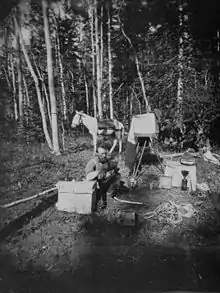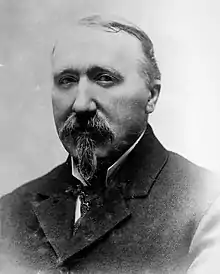John Karl Hillers
John Karl Hillers (1843, Hanover, Germany – 1925) was an American government photographer.

Hillers came to the United States in 1852. He was a policeman and then a soldier in the American Civil War, first with the New York Naval Brigade,[2] then in the army, he re-enlisted after the war and served with the Western garrisons until 1870. He worked as a teamster in Salt Lake City, when he met John Wesley Powell.
Originally hired as a boatman for the second Powell expedition down the Colorado River in 1871, Hillers began to replace Walter Clement Powell, John W. Powell's cousin and assistant to the expedition's photographers, first to E.O. Beaman[3] and then to James Fennemore.[4]
Hillers was Powell's chief expedition photographer on the trip down the Grand Canyon the next year.
He went on to spend twenty years exploring and photographing the American West, and is known particularly for his portraits of Native Americans.[5]
He was the first staff photographer of Powell's Bureau of Ethnology (from 1879) and after returning to Powell's US Geological Survey in 1881 continued Bureau of American Ethnology work until he resigned in 1900.[6] Although he officially retired in 1900, he continued to take photographs for the United States Geological Survey until 1919.[7]
He was the photographer of the first James Stevenson expedition to the Southwest,[8] which brought Frank H. Cushing to Zuni.
3,000 negatives from the Powell Surveys and 20,000 negatives from his association with the Bureau of Ethnology have been credited to John K. Hillers.[9]
John Karl Hillers is the namesake of Mount Hillers, in Utah.[10][11]
References

- "American West Photographs". National Archives and Records Administration. Retrieved 2008-03-23.
- Paula Richardson Fleming and Judith Luskey: The North American Indians in Early Photographs, Dorset Press, New York, 1988 [1st edition Harper & Row, New York, 1986], p. 104
- E.O. Beaman was a New York landscape photographer. He fell out with John W. Powell and left the expedition in January, 1872 and photographed Native Americans in Arizona and New Mexico (Fleming/Luskey, p. 108f. a. 130f. (photography), Jeremy Rowe:Photographers in Arizona, 1850-1920, A History & Directory, Carl Mautz, Nevada City, 1997, p. 77, Dennis Lesard: E.O. Who?, in:American Indian Art Magazine, Vol. 12, No. 2, (spring) 1987, P. 52-61)
- James Fennemore was a British-born Mormon photographer. He was an assistant at the Charles R. Savage's Gallery in Salt Lake City (Fleming/Luskey, p. 109f. and Jeremy Rowe, p. 83).
- "John K. Hillers". Getty Museum. Archived from the original on 2007-07-10. Retrieved 2008-03-23.
- Fleming/Luskey, p. 178
- "The World in a Frame: Photographs from the Great Age of Exploration". Hearst Museum of Anthropology. Archived from the original on 2010-06-22. Retrieved 2010-07-29.
- Fleming/Luskey, p.140
- William Culp Darrah: Beaman, Fennemore, Hillers, Dellenbaugh, Johnson, and Hattan, in: Utah Historical Quarterly, Vol. 17, Nos. 1-4, p. 496.
- Gannett, Henry (1905). The Origin of Certain Place Names in the United States. Govt. Print. Off. pp. 156.
- "Mount Hillers (UT)". summitpost.org. Retrieved 24 June 2014.
Sources
- William Culp Darrah: Beaman, Fennemore, Hillers, Dellenbaugh, Johnson, and Hattan, in: Utah Historical Quarterly, Vol. 17, Nos. 1-4, 1949, pp. 491–503.
- Don. D. Fowler: ′Photographed All the Best Scenery′: Jack Hillers' Diary of the Powell Expeditions, 1871–1875, University of Utah Press, Salt Lake City, 1972.
- Don D.Fowler: The Western Photographs of John K. Hillers: ′Myself in the Water′, Smithsonian Institution Press, Washington, D.C., 1989. ISBN 0-87474-441-5
- Don. D. Fowler: Cleaving an Unknown World: The Powell Expeditions and the Scientific Exploration of the Colorado Plateau, University of Utah Press, Salt Lake City, 2012. (updated publication containing Hillers' diary and photography). ISBN 978-1-60781-146-6
External links
- A short biography
- Some photographs
- John K. Hillers Southwest photograph album, c. 1879-1881 Historical Photograph Collections from the University of Oregon Libraries
- Photography of J.K. Hillers from the USGS Photographic Library
- Stereoviews of Indians and the Colorado River from the J.W. Powell Survey, ca. 1869-1864, (includes photography by John K. Hillers), finding aid and online photo collection, Bancroft Library, University of California, Berkeley
- Inventory of Photographs Made by John K. Hillers of Zuni, Hopi and Navaho Country [graphic], 1879 at The Bancroft Library
- The John K. Hillers Photographs of Zuni, Hopi, and Rio Grande River Pueblos at The Newberry Library